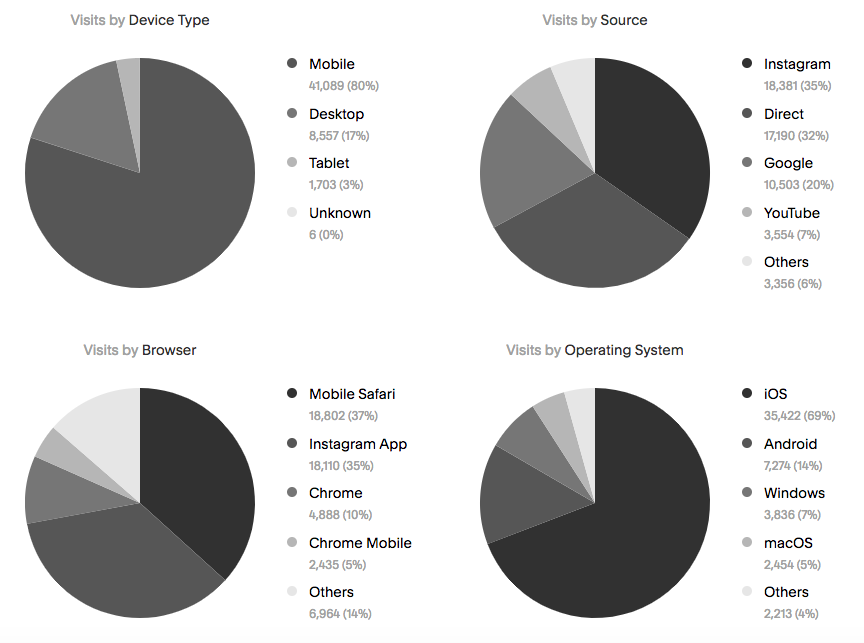So your business is considering launching (or re-launching) a new website? If so, you’ve probably heard of popular site builders like Squarespace and WordPress.
Let’s pit Squarespace and WordPress against each other and see who comes out on top.
In this article we’ll compare and contrast Squarespace’s and WordPress’:
- Access to data,
- Analytics,
- Blog management,
- Extensibility,
- Page building,
- Search engine optimization (SEO), and
- Theming and styles.
Only care about a few of these? Click the links above to jump to that part of the article.
When you’ve finished this article you’ll have all the info you’ll need to make an informed decision for your business’ new website.
Content Management Systems
But before you jump into the nitty gritty of comparing and contrasting these two platforms you may want to know a bit more about what they are.
Squarespace and WordPress are both “content management systems”.
A content management system (CMS) gives website developers, owners, and admins the ability to build, write, modify, and extend web content. Using a CMS means that you may not need to write any code to modify a page, publish a blog post, add a product, or change simple settings. Both Squarespace and WordPress do these things and more.
Content management systems have become so advanced that you will often hear them referred to as “website builders”. Squarespace in particular advertises itself as a website builder because you may not need a web developer to launch your simple Squarespace website.
A robust CMS allows website owners to update content without being tied to their web developer. Hey, we love it when you call us but it’s 2019 – you shouldn’t be chained to your web developer to make small updates!
Does a CMS seem like something you need for your next website? Well let’s dive in!
What is Squarespace?

Like many excellent content management systems, Squarespace began as a blogging platform. But a decade after it’s launch it had begun to add e-commerce tools, analytics, and other business focused features.
Today Squarespace boasts more than one million live websites and is focused on a seamless drag and drop, what-you-see-is-what-you-get (WYSIWYG) interface.
Easy drag and drop functionality, widgets, and paid add-ons are cornerstones of the Squarespace experience.
What is WordPress?

WordPress and Squarespace first hit the Web around the same time. While Squarespace was transitioning into a scalable company WordPress was dominating the online blogging space.
Eventually WordPress would go on to power a large portion of the Internet.
WordPress is a freely available and easily customizable CMS (although also available through the paid WordPress.com hosting service). It isn’t sold by a single company nor does it lock you into one company’s platform.
Today WordPress is the most popular CMS online and powers about a third of all sites on the Web.
Bloggers, e-commerce store owners, and web specialists alike are choosing WordPress to power their sites.
In this artilce we are evaluating the more popular and powerful WordPress software available through wordpress.org (not the paid WordPress hosting service at WordPress.com).
Squarespace Vs WordPress
These two platforms are here to stay. Both Squarespace and WordPress have been making websites easier to manage since 2003 and they aren’t going anywhere.
But choosing which CMS to use for your next website is still an important decision.
Ideally, even if you end up redesigning your site a few years later, the platform you choose today is the one your website will remain on for the foreseeable future.
You need to ensure that your website can grow with your business.
Access to Data
Your website is yours and you can do with it what you want.
Or is it? And can you?
Not every web building platform or CMS gives its users the same access to data.
The distinction between Squarespace and WordPress in this regard is sharp.

Squarespace only allows its users to export certain data sets from their sites as an XML file including:
- Regular Pages
- Gallery Pages
- Project Pages
- One Blog Page and all of its posts
- Text Blocks
- Image Blocks
- Text from other blocks like the Embed Block, Twitter Block, and Instagram Block will export with minimum structure.
- Comments
Anything else, including site theme, design, functionality, and multimedia content can’t be moved to another host. If you want to move the entire look and feel of your site off of Sqaurespace you’ll need to ask a web specialist to recreate it.


WordPress, by contrast, gives its users complete access to their content. Sure, you can export content to an XML file (just as you can with Squarespace). But you can also ask your hosting provider for access to the site files and database. If the data is there you can transfer it to another host or platform. Your mileage may vary depending on where you want to move your site to but WordPress at least makes it clear that the data is yours.
The disparity between these platforms over access to data is rooted in their business models.
Squarespace is a corporately owned software as a service (SAAS). They make money by retaining control of their proprietary software platform and making it as attractive to users as possible. This isn’t a bad thing (hey, your music streaming service and office software suite are probably using a similar business model). Yet this does mean that there is a strong incentive for Squarespace to keep most of your site locked down within their own platform. Want your site to keep humming along smoothly? Stay with SquareSpace.
WordPress is open source software. It is freely available to anyone. You can even help make the WordPress of tomorrow over at make.wordpress.org. Companies that support WordPress make money by helping businesses get the most out of the platform, selling plugins, and selling themes. WordPress, because it is decentralized and community driven, has a strong incentive to give its users as much access to their data as possible.
Access to Data Victor
WordPress is open and accessible to site owners and managers but that can’t be said for Squarespace. WordPress wins this round.
Analytics
Your business needs a return on your digital investment. Maintaining a website costs your company time and money. Publishing relevant content can sap even more resources.
Analytics is one way of evaluating how your website is doing over time.
Analytics services, like Google Analytics, can be connected to either Squarespace or WordPress and tracked on their own platforms. But what if you want a second opinion? Or a way to view analytic data from right within your admin panel?
Both of these popular web builders come with analytic options.

Squarespace has its own proprietary analytic tool. It is deeply integrated into the platform and offers robust data for e-commerce stores without the complex integration often required with third party solutions.
With Squarespace you can launch your site and start compiling data immediately – even revenue and abandoned cart data!

WordPress, by contrast, doesn’t include any robust analytic platform out of the box. But everything is just a plugin away.
Jetpack Analytics and Monster Insights are two of the most popular analytic plugins for WordPress. These plugins integrate with their respective analytic services and provide some of that data right within the WordPress dashboard.
Analytics Victor
We’re going to hand it to Squarespace for this round due to ease of use, essential e-commerce data, and lack of technical knowledge necessary for set up.
Yet both website builders can be easily integrated with powerful third party analytic services. Your SEO or Web Development agency can assist you in setting things up if necessary.
Blog Management
Your website needs a blog. Yes, yours. Blogging is still one of the most effective forms of content marketing and despite the naysayers they’re performing as well as ever.
If you’re considering SquareSpace or WordPress you probably either have a blog or you want one.
Both of these platforms started as blogging platforms. But which should you choose for your company blog?
For the end user (like your marketing manager, content writer, or yourself) actually drafting and publishing on these platforms is fairly similar thanks to WordPress’ new editor.
Think blocks. Blocks of content that is.
Both of these website builders use blocks of content when drafting blog posts so that you can easily add great content and move it around.

SquareSpace has a clean and beautiful interface. Everything from text to galleries are just a click and drag away.

Oh, and simple site options are just a tab away – including scheduling the post to publish while you’re on your next business trip.

WordPress has all of these features as well. Block based editor, great set of content types out of the box, post scheduling, multiple authors, embedded forms, and more – its all here.
In fact, these two website builders are so similar in out of the box features that contrasting the two is objectively difficult.
Blogging Victor
It’s a tie. These blogging platforms grew up side by side and it shows. They’ve learned from each other (and stolen from each other) to create two of the best blogging platforms on the Web.
But before you think that it doesn’t matter which you choose read the next section! Because when you’ve been blogging a while you’ll probably need some new features…
Extensibility
The average website design lasts about three years* (need a new one – we’ve got your back). But your site’s content and platform should last much longer than that.
Your business shouldn’t need to transfer to a whole new web platform with every website redesign – and why should you?
If your website is going to last through multiple design iterations you and your web specialist are going to need access to data and extensibility.
Extensibility is the ability to expand and grow your site’s functionality.
But SquareSpace isn’t easily extensible. SquareSpace wants you using their platform, their blocks, and paying them for all of your needs. Again, this isn’t a bad service model and it fits many clients who need simple sites quite well. Sites maintained in a closed system like this just don’t break. But you’re also not in control.
Your experienced SquareSpace specialist may be able to extend your website beyond the built-in blocks. There are communities of SquareSpace developers who are creating new functionality for their sites (and yours). But you may need a specialist to inject code for you – and a higher paid tier of SquareSpace so they have access.

Overall, SquareSpace is an extensibility disappointment. There is no open plugin platform and the few communities that do exist have mere hundreds of plugins (most of them simple).
WordPress, by contrast, is an extensibility dream come true.

In the WordPress community we call these plugins.
Plugins are snippets of code that site admins can install with a few clicks. Most users can install plugins without any technical knowledge.
The official WordPress repository alone has nearly 55,000 plugins. Compare that to the few hundred unofficial SquareSpace plugins…
Need a new type of form? Search for a plugin, install it, and configure it – you’re good to go! Without ever touching any code.
With the official plugins and the third-party communities combined, WordPress has the largest plugin community of any content management system – hands down!
This also means that some WordPress specialists can develop custom plugins particular for you and your business (like connecting your e-commerce store to automatically send orders to your drop-shipper).
Extensibility Victor
WordPress is the king of open source third-party development opportunities. If you want your website’s functionality to grow with your business over time WordPress may be the way to go.
Page Building
Writing a blog post is one thing – creating a full featured and attractive landing page is another. In addition to adding content to the page you need to design the layout.
Both WordPress and SquareSpace derive their page builders from their block based editors. The experience is nearly seamless as you transition from writing a blog to editing a page – and back again. But neither page builder makes it particularly easy to add that full width video at the top of the page followed by a three column layout with your accent color (for example).
If you know HTML and CSS your options open way up… but assuming you don’t here’s what these web builders have to offer:

SquareSpace brings its beautiful and clean block interface to page building. The page layout and design is completely dependent upon your theme but you can drag and drop content blocks as needed. Building a page on SquareSpace is as pleasant as drafting a post. No clutter and plenty of simple options.
But if you want to get creative with page layout you may get frustrated. Blocks are meant to add content to existing layout. With your theme controlling much of the page layout and design your creativity may get a bit cramped.
When you first install WordPress you get the same thing. Themes control page layout and the block editor is for adding content to that layout.
However, WordPress is extensible. Want a drag and drop page builder that lets you design the layout and the content while also giving you a ton of design options? Its just a plugin away.

Elementor and Cornerstone are two of the best page builders on the market. Let your creative juices flow.
Page Building Victor
Out of the box these two platforms bring nearly the same page building experience to their users.
But we aren’t sure we can give this round a tie with such powerful page building software a few clicks away for any WordPress site that wants them.
If you want robust page building functionality choose WordPress with a professional page builder installed.
Search Engine Optimization (SEO)
There are three pillars to SEO regardless of your web building platform:
- Technology,
- Content, and
- Backlinks.
You (or your creative content agency) will be creating the content for your website and you’ll build backlinks with time (please do so strategically).
Where content management systems like SquareSpace and WordPress come in is technology.
SquareSpace is at the top of their game with search engine optimized simple site technology. Every SquareSpace website includes:
- A sitemap
- SSL certificates
- Structured metadata
- Mobile optimization
- And more
These are technology decisions the average business owner or marketing director doesn’t know how to implement from scratch themselves. SquareSpace takes the pain out of the process by just implementing these features, by default, on every site.
WordPress isn’t quite so clean cut.
Want a sitemap that’s automatically updated? You’ll need a plugin.
Want to have that green lock next to your domain? Go contact your hosting provider about an SSL certificate than fiddle with your site’s URLs to ensure everything points to an HTTPS connection.
Want to customize structured metadata for every page or post? You guessed it, you need a plugin.
WordPress, when implemented right, produces clean code that is easy to optimize. Plus, every technology that an optimized site needs can be implemented on WordPress. Even nontechnical users can cover most of their bases just with the free tier of the Yoast SEO plugin.
The upside to WordPress is that if you are really serious about your SEO and hire an outside agency to help, WordPress’ technology is open and takeable. Anything is possible.
SEO Victor
We at Rystedt Creative love WordPress and we love SEO. But let’s face it, SquareSpace is just so easy to use properly out of the box. With SquareSpace you can have most of your site technology optimized before you ever launch your site – even if you aren’t a technical person.
Theming and Styles
Your website should express what makes your company uniquely great.
But can it do that if it looks like thousands of other websites? Unlikely.
Website theming is the ability to install a pre-designed theme and customize it for your site. A theme usually includes page layouts, headers, footers, built in functionality, colors, and typography. So the entire look and feel of your website!
Themes are a big deal and both SquareSpace and WordPress use them.

SquareSpace calls them “templates”. These templates are some of the best looking on the market and are usually up with the latest design trends (exaggerated whitespace for the win!). But there is only about 100 templates to choose from. That means that the majority of the 700,000+ websites powered by SquareSpace* are all using some form or another of those 100 templates. That’s a lot of repeat designs.
SquareSpace templates are fairly customizable from right within the dashboard. You’ll want to contact a SquareSpace specialist if you need a completely unique template or heavy customization, but the out of the box features suit most users.

WordPress calls these “themes” – and has a lot of them available. By a lot we mean thousands in the official wordpress.org repository alone. And hundreds of thousands available in communities across the Internet. You are bound to be able to find something that fits your business.
However, your customization mileage will vary depending on (a) how customizable the theme developer made his product and (b) how much technical knowledge you have.
The average WordPress theme is difficult for the non-developer to customize. But there are some amazing ones out there with nearly limitless options – like the Pro theme from theme.co.
Theming Victor
Which do you care more about? Having countless theme options? Or countless ways to tweak a theme after it is installed?
Your answer to that question will probably affect which platform you think wins this round.
SquareSpace templates tend to be easier for a non-developer to customize but WordPress has nearly limitless themes available.
Both platforms support custom developed themes (although you’ll need a certain paid tier with SquareSpace to make use of them).
We’re calling this a tie. Who do you think wins this round (and why)?
Which Content Management System Should You Choose? Squarespace or WordPress?
You need to choose the best web building platform for your business. We can’t make that call for you. Hopefully this article has given you all the data you need to make an informed decision. At the end of the day it may come down to one or two factors you care about most.
But we love scores, points, and winning so let’s tally the score! Which CMS is the “best” choice? Squarespace or WordPress?
| Squarespace | WordPress | |
|---|---|---|
| Access to Data | x | |
| Analytics | x | |
| Blog Management | x | x |
| Extensibility | x | |
| Page Building | x | |
| SEO | x | |
| Theming and Styles | x | x |
| Victor | WordPress |
Who do you think won? Let us know in the comments below.



